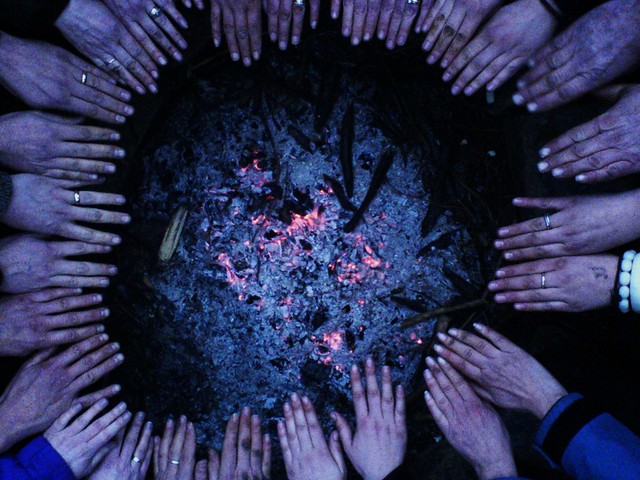In a recent post a new provocation came from the children. My job when I am in this particular school is to follow the children's lead and extend their ideas. This can be really exciting, especially as it is a large foundation stage with 100+ three to five year-olds. I was talking to my friend Jen about the new provocation and how the children had started off making a pretend fire with sticks. One child started rubbing sticks together to make fire and the others all copied. Because rubbing sticks together is how you make fire right?
Well yes, it was until some bright spark invented the friction match in 1827, and before that in the 17th century there were chemical spark makers, but as Jen and I were talking we realised that more often than not when you see children playing at lighting imaginary fires, they rub sticks together.
As often happens when you get two playworkers in a room we started hypothesising as to why this should be. Bob Hughes in is Taxonomy of Play Types(1) puts forward the notion of Recapitulative Play – "Play that allows the child to explore ancestry, history, rituals, stories, rhymes, fire and darkness. Enables children to access play of earlier human evolutionary stages."
Through play children displays aspects of human evolutionary history that have been stored and passed on through the genes or shared memory and these emerge when children play spontaneously. When children play they are reflecting the things that children throughout history would have done as part of their learning to become an adult member of society. It contributes to the explanation of why den building and shelter making are always so popular and why children like to a play with sticks, transforming them into weapons like spears and bows and arrows. None of these are important skills for life in the 21st Century but they have a powerful pull on the mind of a child.
The ritual aspect of children play is also an important element of recapitulative play. I remember years ago lighting a cooking fire with a group of children and them spontaneously forming a ritual dance and chant to help the fire light burn brighter.
 |
| cooking popcorn |
I'm sure there are lots of cartoons and other representations that would explain why children rub sticks together to make fire. But they see matches, lighters, and cookers with ignition buttons being used more commonly and I can't think of a time when I have seen children role playing fire lighting in these ways.
So having found a starting point from the children's play I was thinking of directions we could extend. So the next day that I was in school I brought a fire drill and fire flash with me figuring that the rubbing of things together to make fire was an important element in the play that we could develop into their learning.
 |
| Trying to make the fire machine (bow drill) work |
They were fascinated by the fire drill and called it a fire machine but despite us taking a lot of time and care, working together very well as a team there are just too many elements for a group of 4 and 5 year-olds to coordinate. The fire flashes (we call them dragon sneezes) were much more successful. The sparks we made encouraged the idea that we able to make real fire. Which led really well into talking about how we were going to stay safe.
Because the setting is so large and all the children are able to flow freely in and out, I was wondering how having a real fire would work. I felt like I wanted to be able to concentrate 100% on the children and their reactions. So when I found a stash of portable barbecues I felt this would be an excellent way to introduce the children to fire and focus on our safety rather than having to think about the fire too. It amazed me how, as more and more children were drawn over to the fire area they sat down and chose to stay sitting there, others told them how to behave and they were incredibly respectful and didn't try to push the boundaries at all. Two boys brought drums out and we had some wonderful renditions of their favourite songs (currently 'down in the jungle' and 'little rabbit foo foo') whilst we cooked up bowl after bowl of popcorn.
So whilst there is some controversy over the years about including Recapitulative play in the list of play types (it is left off of some lists entirely) it addresses forms of play and powerful urges to play in ways not found elsewhere.
(1) Bob Hughes, published in full in ‘A playworker’s Taxonomy of Play Types’
(PLAYLINK, second edition 2002)






